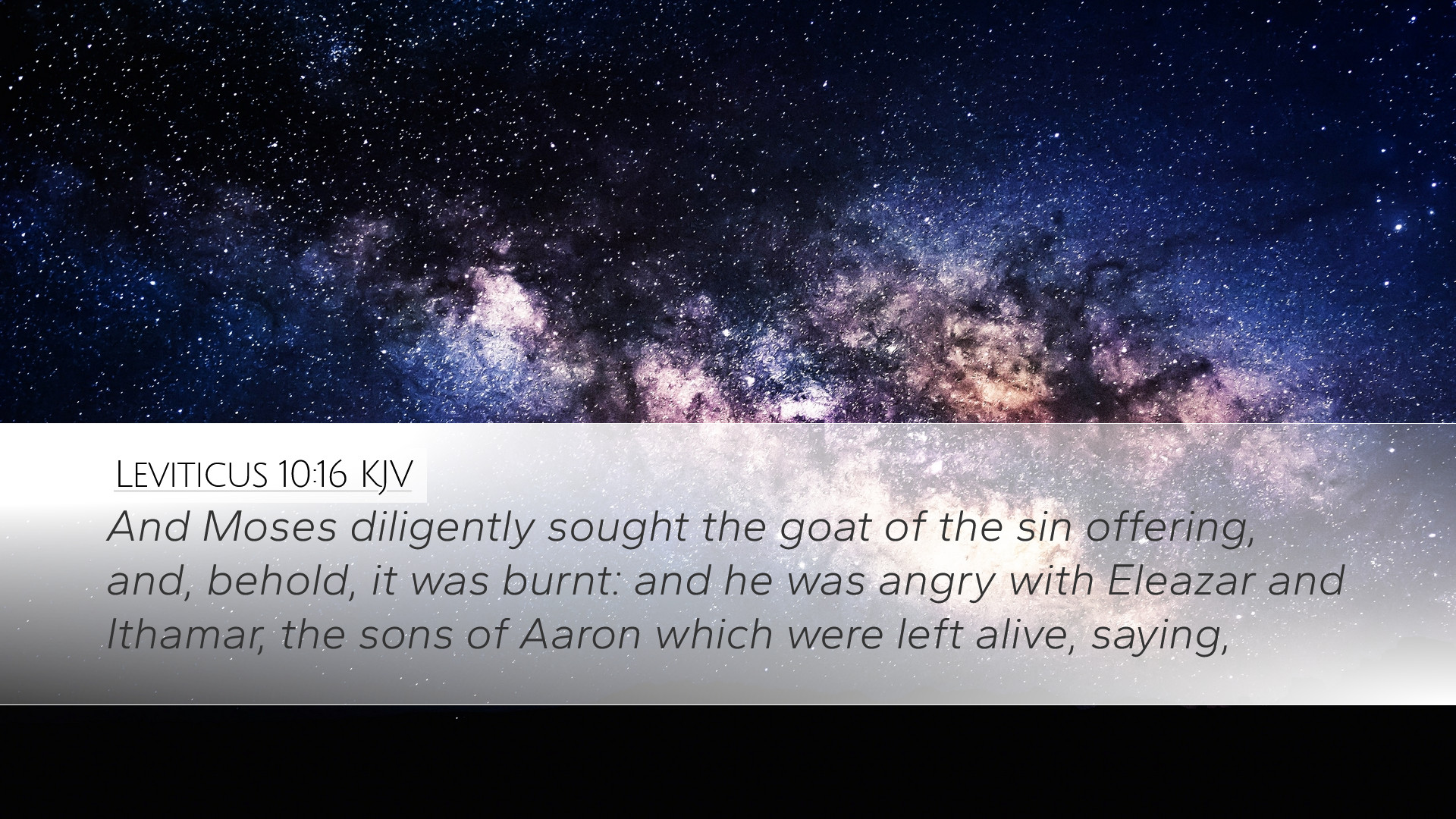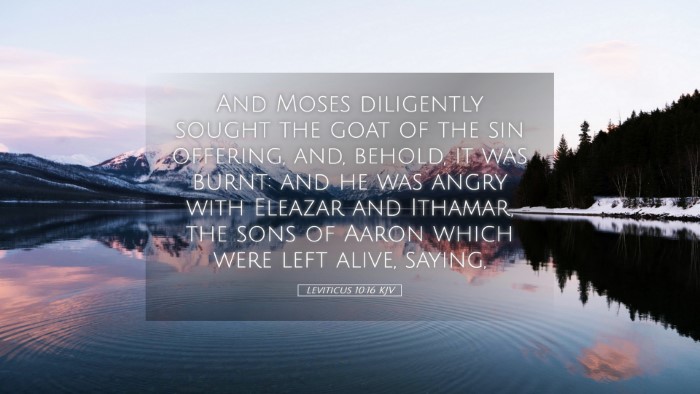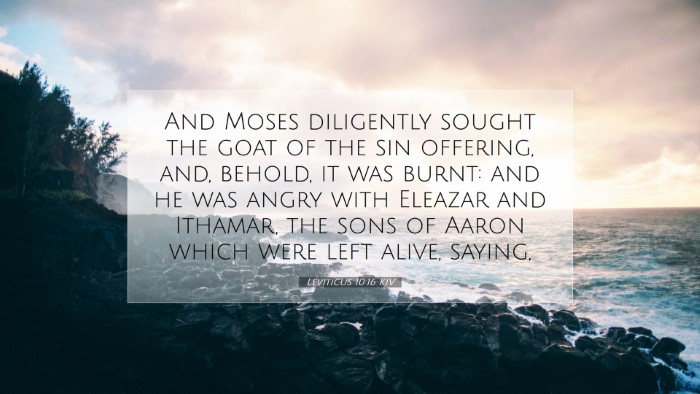Commentary on Leviticus 10:16
Bible Verse: "And Moses diligently sought the goat of the sin offering, and, behold, it was burnt: and he was angry with Eleazar and Ithamar, the sons of Aaron which were left alive, saying, "
Introduction
Leviticus 10:16 presents a critical moment in the broader narrative of the Israelite priesthood, showcasing the severity of adhering to God's commandments regarding offerings and sin. This verse highlights the importance of obedience within the sacred duties of Aaron’s sons, Eleazar and Ithamar.
Context of Leviticus 10
The chapter opens with the tragic account of Nadab and Abihu, Aaron’s sons, who offered "strange fire" before the Lord, leading to their immediate death. This pivotal incident underlines the holiness of God's presence and the stringent requirements of worship. The consequences of disobedience set a solemn tone that reverberates through the remainder of the chapter, emphasizing the gravity of sacred responsibilities imposed on the priesthood.
Examination of the Text
In this verse, Moses diligently seeks the sin offering goat that was intended to atone for the community's sin. His anger upon finding that it was burnt is not merely a personal disappointment; it serves as a representation of God’s displeasure with improper practices in sacrificial rites. The following points expound on the key themes presented in this verse:
1. The Importance of the Sin Offering
Matthew Henry outlines that the sin offering is central to the atonement process, meant to reflect the need for purification and reconciliation with God. The sin offering symbolizes the seriousness of sin and the necessity of making amends through the proper channels ordained by God. The verse illustrates that when offerings are mishandled or disregarded, it not only disrupts the divine order but also leads to grave consequences.
2. The Role of Moses as a Leader
Albert Barnes highlights Moses' diligence in seeking the goat, revealing his commitment to uphold the sanctity of the rituals. Moses acts as a mediator, a role that is emphasized throughout the Pentateuch. His anger is not an expression of personal grievance but rather indicative of a leader’s responsibility to ensure adherence to God’s commands. This underscores the weight of leadership within the community of faith.
3. Divine Judgment and Human Imperfection
Adam Clarke comments on the implications of the burnt offering, suggesting that it indicates human failure in following divine instructions precisely. The consequences that befall Nadab and Abihu serve as a stark reminder of the necessity for holiness and proper worship practices. Clarke notes that this incident is not solely about punishment but serves as a divine lesson regarding purity and reverence in worship.
4. Implications for Worship and Obedience
This verse and its context speak volumes about contemporary worship practices in the church. The emphasis on obedience to God’s commands resonates deeply with pastoral theology today. Churches are consistently called to examine their practices and ensure they align with biblical teachings, illustrating the timeless nature of God’s expectations.
Theological Insights
Leviticus 10:16 provides multiple theological insights that are critical for understanding God’s nature and the relationship He desires with His people.
1. Holiness of God
God’s holiness is paramount in this text. The fact that Nadab and Abihu died for their transgressions emphasizes that God's ways must be revered. Worship must come from a place of deep respect for who God is, as failure to acknowledge this can lead to severe repercussions.
2. The Role of Atonement
The significance of the sin offering points to the broader biblical narrative where atonement is offered for humanity through Christ. Leviticus 10:16 foreshadows the ultimate sacrifice made by Jesus, who fulfills the law and offers a perfect atonement for sin, making the principles of sacrifice and offering eternally relevant.
3. Leadership and Accountability
Moses' leadership in this moment suggests that those in positions of authority bear the weight of holding others accountable for their worship practices. Today, pastors and church leaders are similarly called to ensure that their congregations worship appropriately and follow Christ with integrity.
Practical Applications
For pastors, theologians, and students, Leviticus 10:16 has several practical applications:
- Vigilance in Worship: Leaders must be vigilant in ensuring that worship practices are aligned with biblical mandates.
- Understanding Disciplinary Actions: The harsh penalties imposed in this chapter should encourage an understanding of God's holiness and lead to a more reverential approach to worship.
- Legacy of Leadership: This text reinforces the importance of spiritual leadership that is committed to upholding God's commandments.
- Embracing the Atonement: Reflecting on the sin offering reminds believers of their need for atonement and the joy of knowing that Christ fulfills all sacrificial requirements.
Conclusion
Leviticus 10:16 serves as a profound reminder of God's holiness, the necessity of obedience, and the critical role of leadership within the community of faith. By carefully considering insights from historic commentaries, we can appreciate the weight of this text in contemporary contexts and strive to cultivate a worship experience that honors God’s commands in spirit and truth.


